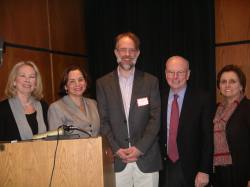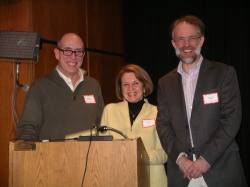Scarsdale Forum Calls For Reduction in School Budget Growth
- Tuesday, 08 February 2011 14:56
- Last Updated: Tuesday, 08 February 2011 15:11
- Published: Tuesday, 08 February 2011 14:56
- Hits: 20277
 At their February 3rd meeting, the Scarsdale Forum focused on education and heard presentations from the School Administration and School Board President Jill Spieler, and considered two reports produced by the Educational Fiscal Committee on Teacher Compensation.
At their February 3rd meeting, the Scarsdale Forum focused on education and heard presentations from the School Administration and School Board President Jill Spieler, and considered two reports produced by the Educational Fiscal Committee on Teacher Compensation.
The meeting opened with a presentation from school administrators providing the rationale behind the Scarsdale educational program and an explanation of the drivers of the school budget. As the School Administrators and Board were well aware that the Forum had issued a report that cited Scarsdale’s high staff salaries, the Superintendant, Assistant Superintendants and School Board President sought to educate the group about the excellent education financed by community tax dollars.
Lynn Shain, Assistant Superintendant for Instruction gave a presentation called “The Building Blocks of a Scarsdale Education” which connected the elementary school program with the outstanding achievements of high school students in Scarsdale. She explained how the district’s literacy program, Singapore math program, and “inquiry” approach” to social studies and science, teach critical thinking skills that are essential to success in higher education.
Board President Jill Spieler reviewed some new and innovative programs that have been adopted by Scarsdale teachers, contending that our contract with staff “does not impeded innovation.” In the past few years, the district has moved to Singapore Math, introduced new eighth grade assessments and completed the transition from the AP program to AT. In addition, the district has “embraced the use of digital tools, to making learning relevant.” World language instruction has been extended to sixth graders and an after-school program in Mandarin has been added.
Furthermore, she said, “over the last year the community has supported the current program.” She warned that, “We can’t continue to cut the number of teachers without increasing class size or cutting programs.”
Yielding his time to others, School Superintendant provided a philosophical note on the current budget woes, saying, “Given the unusual heat we should recall that the object is an enlightened outcome.”
Linda Purvis Assistant Superintendant for Business took the stage to review the drivers behind the school budget. In an explanation of budget growth she listed the following factors:
- Since 2001, district enrollment has grown from 4300 students to 4800 students
- Mandated costs for pensions and health benefits are the fastest rising costs in the budget
- In 2000, the community authorized $100 million in construction costs, and the debt service from those projects increased the annual school budgets
- The addition of a fourth house in the Middle School and the reduction of elementary school class sizes necessitated the hiring of additional teachers and staff
- In response to the community, the district expanded extracurricular activities to allow wider student participation.
In the past three years, school budget growth has been modest with a 2.91% increase in 2008-9, 1.95% increase in 2009-10 and 2.87% increase in 2010-11.
A proposed 2% tax cap that has been passed by the State Senate is now before the State Assembly. If enacted, it would be imposed for the 2012-13 school year and require Scarsdale to cut approximately $6 million from the school budget. Likely targets of cuts would be educational programs and athletics, and increases in class size may result.

Bensche opened by telling the group that the committee had a “real barn burner of a time discussing two volatile issues; your kids and your money.” He then said, “Talking about teachers’ compensation is a losing proposition – and I have lost hair, lost weight and lost my temper.
Telling the group that the committee made many compromises so that they could get the broadest possible support, he contended that the compounded school budget growth rate is too high. In their 26-page report, the committee found that the average compensation for Scarsdale’s 606 school employees was $122,995 with benefits of $45,350 for an average of $168,345 in salary and compensation per employee. In comparison to Chappaqua, Scarsdale pays teachers a premium of 10-15% and they also found that in 2008-9 Scarsdale’s median salary was the highest in the state.
He explained that the committee was not in favor of cutting current salaries but addressing the future growth rate. The committee recommended that:
- The Board reduce the rate of growth of total compensation by reconsidering STEP and Cost of Living increases.
- The district lobby for pension reform and mandate relief.
- The district require employees to pay a larger percentage of their healthcare costs
He concluded, by saying, “Something’s gonna have to give or I am going to run out of money.” Though he was jocular, Bensche knew his audience who rewarded his performance with a warm round of applause.
Former teacher Mary Beth Evans presented the minority report written by Evans, Nan Berke who is the President of the SHS PTA, attorney Arthur Rublin and Eric Staffin who is the treasurer of the TVCC and former President of the Eastchester Foundation.
They concurred that “today’s conditions call for conservative growth,” but the minority report disagreed with the majorities “top-down, constricted approach to educational budgeting, which sets a target for budget growth tied to the rate of inflation plus enrollment growth. “ They argued that, “This approach fails to account for either the general reality of education or the current reality of rising health care and state mandated costs that are beyond our local control. Given such realities we cannot aim for such an unrealistic target and continue to ensure the same high quality of public education in Scarsdale.”
They also disagreed with a reduction in “the rate of teacher compensation growth in order to reach for a budget growth target tied to inflation plus change in student enrollment.” In their view, this would “slow the rate of teacher salary growth to below that of neighboring districts.”
Evans continued with, “Given the projected combined costs of market-driven health care and retirement contributions, which alone are expected to total about 2.5 % in “real” budget growth for the coming year, it is difficult to imagine how we might productively or prudently aim for teacher compensation growth tied to inflation.”
The floor was opened for comments and several people spoke to favor of the majority report. When votes were counted, The Forum adopted the majority report by a vote of 60 to 17.
With pressure from the community to curb tax increases and rising costs from the state, the School Board and Administration face another tough year of crafting a budget that will receive voter approval in May.
Pictured at top: Lynn Shain, Jill Spieler, Bruce Wells, Michael McGill, Linda Purvis







